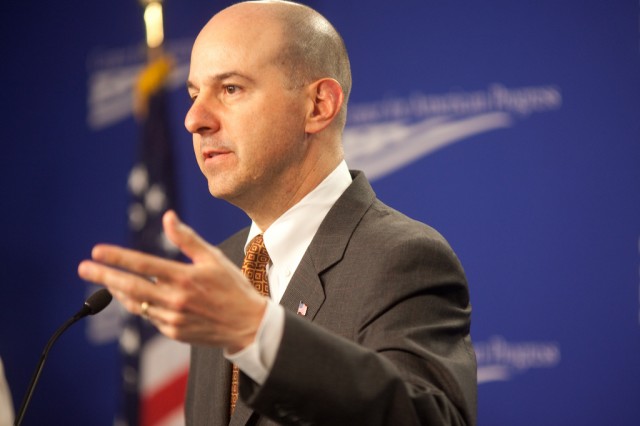
David Kappos, the head of the United States Patent and Trademark Office, offered a strong defense of software patents in a Tuesday address at the Center for American Progress. Kappos touted several provisions of the America Invents Act (AIA), which he argued would allow the patent office to weed out low-quality software and business method patents.
Addressing those who claim the patent system is broken, Kappos said, "Give it a rest already. Give the AIA a chance to work. Give it a chance to even get started."
Kappos focused on the post-grant review procedure established by the AIA. This procedure allows third parties to challenge the validity of a patent after it has been approved by the patent office. He noted that the courts have tightened the rules for patent eligibility, and said that the new procedures established by the AIA "gives us the opportunity to address patents that would not have issued under current law."
He noted that during a time of growing litigation in the smartphone industry, "innovation continues at an absolutely breakneck pace. In a system like ours in which innovation is happening faster than people can keep up, it cannot be said that the patent system is broken," he said.
Indeed, Kappos suggested that the volume of patent litigation in the smartphone industry was a sign that the patent system was working as intended. "The explosion of litigation we are seeing is a reflection of how the patent system wires us for innovation," Kappos said. "It's natural and reasonable that innovators would seek to protect their breakthroughs using the patent system."
Kappos cited a Patent Office report released earlier this year that supposedly shows that "intellectual property" industries "supported the jobs of 40 million American workers, or 27.7 percent of all US jobs." But as we pointed out at the time the report was released, those figures mostly reflect a ludicrously broad definition of "IP-intensive industry." Any industry that makes use of trademark protection is counted as an "IP" industry, meaning that (as we put it in April) "if you hang sheetrock, bag groceries, or answer phones at a paper mill for a living, you're probably in an 'IP-intensive' industry as far as the Obama administration is concerned."
Incentive or disincentive?
"Our patent system is the envy of the world," Kappos said. In his view, the key question in the patent debate is "do we demand today's innovation on the cheap via a weaker patent system that excludes subject matter, or do we moderate today's consumption with a strong patent system so our children enjoy greater innovations?"
This argument ducks the central question in the software patent debate: do patents, in fact, provide a net incentive for innovation in the software industry? Many entrepreneurs say that just the opposite is true: that the disincentive to innovation created by the threat of patent litigation dwarfs any positive incentive effects created by the ability for a firm to get patents of its own.
Empirical evidence backs this up. For example, in a 2008 book, the researchers James Bessen and Michael Meurer found that for nonchemical patents, the costs of patent litigation began to exceed the benefits of holding patents in the 1990s. Software and business patents were particularly prone to litigation.
More recent research has estimated that litigation by patent trolls costs the economy at least $29 billion per year, and that figure may be as high as $83 billion.
Rather than engage in this empirical debate, or even acknowledge its existence, Kappos acted as though it was self-evident that stronger patents always create a larger incentive for innovation.
"To those commenting on the smartphone patent war with categorical statements that blame the so-called broken system on bad software patents, what I say is: get the facts. The facts don't support your position."
With all due respect, Mr. Kappos, we do have the facts. And they support the position of software patent critics.
reader comments
202